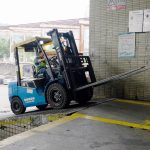The Salón Internacional de la Logística de Barcelona (SIL Barcelona), organised by the Consorci de la Zona Franca de Barcelona (CZFB) dedicated to Logistics, Transport, Intralogistics, and Supply Chain, has conducted the XV Barometer of the Círculo Logístico SIL 2025, which analyses in depth the challenges and needs of companies in the logistics sector, including attracting and retaining logistics talent. The study involved the collaboration of 1.026 professionals holding senior and responsible positions in Logistics or Supply Chain departments in Spain, specialising in different sectors of the industry.
Attracting and retaining talent, the great challenge of the sector
One of the main conclusions of the XV Barometer of the Círculo Logístico SIL 2025 is that attracting and retaining talent remains one of the major challenges that concern companies in the sector. 63.9% of professionals participating in the study state they have difficulties finding qualified personnel, and 28.6% do not always succeed in finding the profile they are looking for. Only 7.5% find it relatively easy to fill vacancies.
Another highlighted conclusion is the emergence of Artificial Intelligence in logistics and the confidence that companies in the sector place in this technology. 91.7% of those surveyed believe that AI can significantly optimise their operations. More specifically, 33,9% believe that AI can greatly contribute to improving their results, while 57,8% trust it can do so considerably.
In the same topic, 76,3% of companies participating in the study are considering incorporating AI into their business. In fact, 44,9% of them already have some AI tool, while 31.4% are in the process of doing so.
Quality, experience and flexibility versus speed
The XV Barometer of the Círculo Logístico SIL 2025 also shows that quality (90,8%), experience (76,1%), and flexibility (74,6%) are not only the most valued aspects by logistics-consuming companies but also increase their interest by 1,4%, 9,7%, and 17,3%, respectively. On the other hand, aspects such as speed lose value, being highlighted by only 28.4% of the professionals surveyed, placing 1.2 points below the results of the previous edition of the study.
Another conclusion of the study is that startups are making their way into the logistics sector, with the support of 77% of the professionals surveyed. 24,8% of the companies participating in the survey already collaborate with one, and 52,2% believe it could be positive to hire or outsource services to emerging companies specialising in logistics. Additionally, 15,9% are still considering it, as they have doubts.
Retaining Logistics Talent
Regarding the concerns of companies, in the XV Barometer of the Círculo Logístico SIL 2025, the quality of service (21,2%), efficiency and optimisation of costs and stocks (15,7%), and punctuality and commitment (14,4%) stand out. In contrast, some historical concerns such as default (0,3%) go almost unnoticed among the professionals surveyed.
Engineers, graduates, and logistics experts: the most sought after
Regarding the most sought-after profiles to fill logistics manager positions, engineers (28%), logistics graduates (25,7%), and logistics experts regardless of their studies (21,4%) remain the most in-demand, although interest in the latter decreases by 6,2% compared to the last study, while interest increases for other profiles such as business administration graduates (11,8%), which stands 2.5 above the result obtained in 2024.
Regarding the commitment to the Sustainable Development Goals (SDGs) by the participating companies in the survey, they identify with: SDG 5 Gender Equality (24.6%), SDG 12 Responsible Consumption and Production (22.5%), SDG 8 Decent Work and Economic Growth (20.5%), SDG 9 Industry, Innovation and Infrastructure (20.3%) and SDG 17 Partnerships for the Goals (12.1%).
Finally, among the aspects considered essential in the logistics of the future, although it drops by 4.8 points compared to the previous year, the automation of operations (26.4%) remains the most prominent, followed by collaboration in transport (18.6%), whose interest towards 2024 also decreases by 8.9%. The consideration given to the exchange of standardised information (19.7%) is also noteworthy, although it also decreases by 2.9, and greater agility in administrative matters (13.3%).
similar news
The post Difficulties in Attracting and Retaining Logistics Talent appeared first on Logistics Business.


